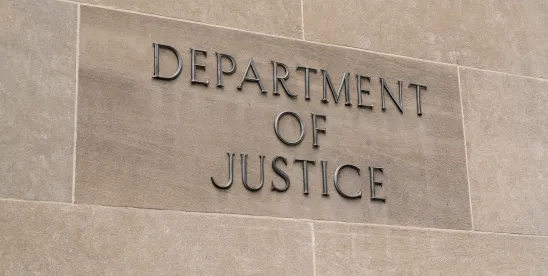On April 7, 2025, U.S. Deputy Attorney General Todd Blanche issued a memorandum titled “Ending Regulation by Prosecution” (the “Memorandum”), which set out clear and direct enforcement priorities for the U.S. Department of Justice (“DOJ”) relating to digital assets. The Memorandum clarifies that DOJ is not a digital assets regulator and that it will not continue with what it characterizes as the prior Administration’s “regulation by prosecution” strategy. Rather, DOJ will now prioritize enforcement actions that target individual bad actors that use digital assets to perpetuate scams or are engaged in other criminal activity involving digital assets such as organized crime, narcotics, and terrorism. Importantly, the Memorandum scales back the scenarios in which DOJ will pursue enforcement actions against digital asset exchanges or other platforms (e.g., mixers or tumblers) that bad actors may use to conduct illegal activity.
In setting out the DOJ’s new enforcement priorities, the Memorandum adheres to the principles contained in Executive Order 14178 (“Strengthening American Leadership in Digital Financial Technology,” January 23, 2025), which outlines the Trump Administration’s policy of promoting “responsible growth and use of digital assets.” The Memorandum also cites Executive Order 14157 (“Designating Cartels and Other Organizations as Foreign Terrorist Organizations and Specially Designated Global Terrorists,” January 20, 2025), which reflects the U.S. government’s decision to seek the “total elimination” of certain international cartels, criminal organizations, and terrorists.
The Memorandum directs prosecutors to refrain from charging regulatory violations involving digital assets, including unlicensed money transmission, registration requirement failures, and Bank Secrecy Act (“BSA”) violations, unless the defendant “willfully” did not comply with the licensing or registration requirement. Additionally, prosecutors are instructed not to pursue charges in situations where DOJ would be required to litigate whether a digital asset is a “security” or a “commodity,” as long as there is a “an adequate alternative criminal charge available, such as mail or wire fraud.”
To carry out these new priorities, DOJ will shift its enforcement resources related to digital assets. Specifically, DOJ will disband the National Cryptocurrency Enforcement Team (“NCET”), which was established in February 2022 and has supported several recent high-profile digital assets investigations and prosecutions. Additionally, the DOJ’s Market Integrity and Major Frauds Unit will no longer enforce cryptocurrency actions and instead will focus on Trump Administration priorities such as immigration and procurement fraud. The DOJ’s Computer Crime and Intellectual Property Section will continue to liaise with the digital asset industry as needed.
Finally, the Memorandum addresses an issue relating to the way in which victims of digital asset fraud are compensated. Currently, regulations only allow victims to recover the value of their investment at the time of the fraud, rather than at the current fair market value. To rectify this issue, the Memorandum directs the Office of Legal Policy and the Office of Legislative Affairs to propose new legislation and regulations that would allow victims to recover a greater amount of their digital asset losses in situations involving fraud or theft.
Key Takeaways:
- The Memorandum neither creates nor eliminates any current laws. Rather, it presents new enforcement and staffing priorities for DOJ, which are tied closely to recent Executive Orders and statements from the Trump Administration.
- The DOJ is focused on prosecuting digital asset scams and the illicit, underground use of digital assets by terrorists, narcotics traffickers, and other organized crime elements. It will prioritize those cases by “seeking accountability from individuals” who perpetuate these crimes, as opposed to pursuing “regulatory violations” at digital asset companies.
- Regulatory failures can still pose a legal risk for companies, however, particularly if the DOJ finds them to be “willful.” Additionally, it remains to be seen how U.S. states will react to the potential “enforcement vacuum” in the digital assets industry, and whether they will seek to fill the void with a more aggressive enforcement approach.




 />i
/>i

